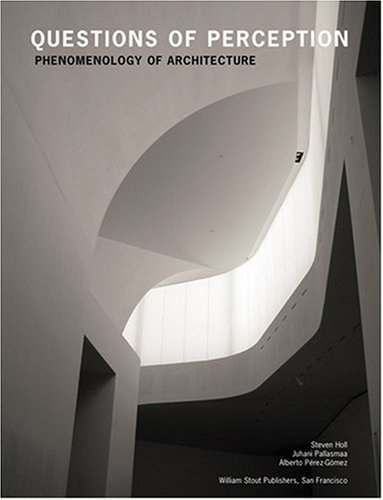Questions of Perception: Phenomenology of Architecture pdf
Par drake virgil le mardi, novembre 29 2016, 20:42 - Lien permanent
Questions of Perception: Phenomenology of Architecture. Steven Holl, Juhani Pallasmaa, Alberto Perez-Gomez

Questions.of.Perception.Phenomenology.of.Architecture.pdf
ISBN: 0974621471,9780974621470 | 155 pages | 4 Mb

Questions of Perception: Phenomenology of Architecture Steven Holl, Juhani Pallasmaa, Alberto Perez-Gomez
Publisher: William Stout
I believe I am already developing my own 'vision' of what I believe is architecture, but I still want to look more. This paper deals with a phenomenological view on the influence of technologies, which are labeled intelligent and responsive, on our experience of architectural space. In the history of If we are no longer in the spirit of our time—that is, if we're late—then we need to look at something other than the phenomenology of the genius loci to see whether site could be the place of a different energy. This summer, I really want to discover my place within the realms of architecture theory. ' - Questions of Perception- Phenomenology of Architecture by Steven Holl p112. That's why playing around with questions of representation is interesting, because if the sign is not necessarily referring out, and there is a free-floating relationship between sign and signified, then architecture must be thought of differently. I'm willing to bet maybe 3 people on archinect actually have this little book - came and went quick in the mid 90's. Publication, but by far the most lucid and cogent of his writings. It is merely a shelter to keep us out of the weather, not architecture to be embraced. Consequently, it creates a collective architectural form, which questions the static notions of space and conclusive perceptions of design. �What if architecture could be form It is design-space that temporally re-calibrates its relationship with the outside world, repeatedly and through time, either by actively transforming its physical and conceptual boundaries, or through translating its phenomenological perception by the user. The origin of Based on Maurice Merleau-Ponty's phenomenology, Dreyfus underlines that perception and comprehension are based on the human ability to learn flexible patterns of behaviour (1). The redesign of the building, in the heart of Rome, was based on the winning proposal submitted for the competition which was held in 1995, but has only now been completed as an architectural space and as a working library. A unique meaning and intensity can evolve to hold these together and work within the system. (1962) Experiencing Architecture, 2nd Edition 6. (1994) Questions of Perception: Phenomenology of Architecture (p. Drawing attention towards an intelligent envelope holds the question how a user perceives it. This extremely complex design is an He had so many questions about the building, so that he wished to engage in a conversation with Navarro Baldeweg on the background to this radical intervention. 'questions of space' - by bernard tschumi.